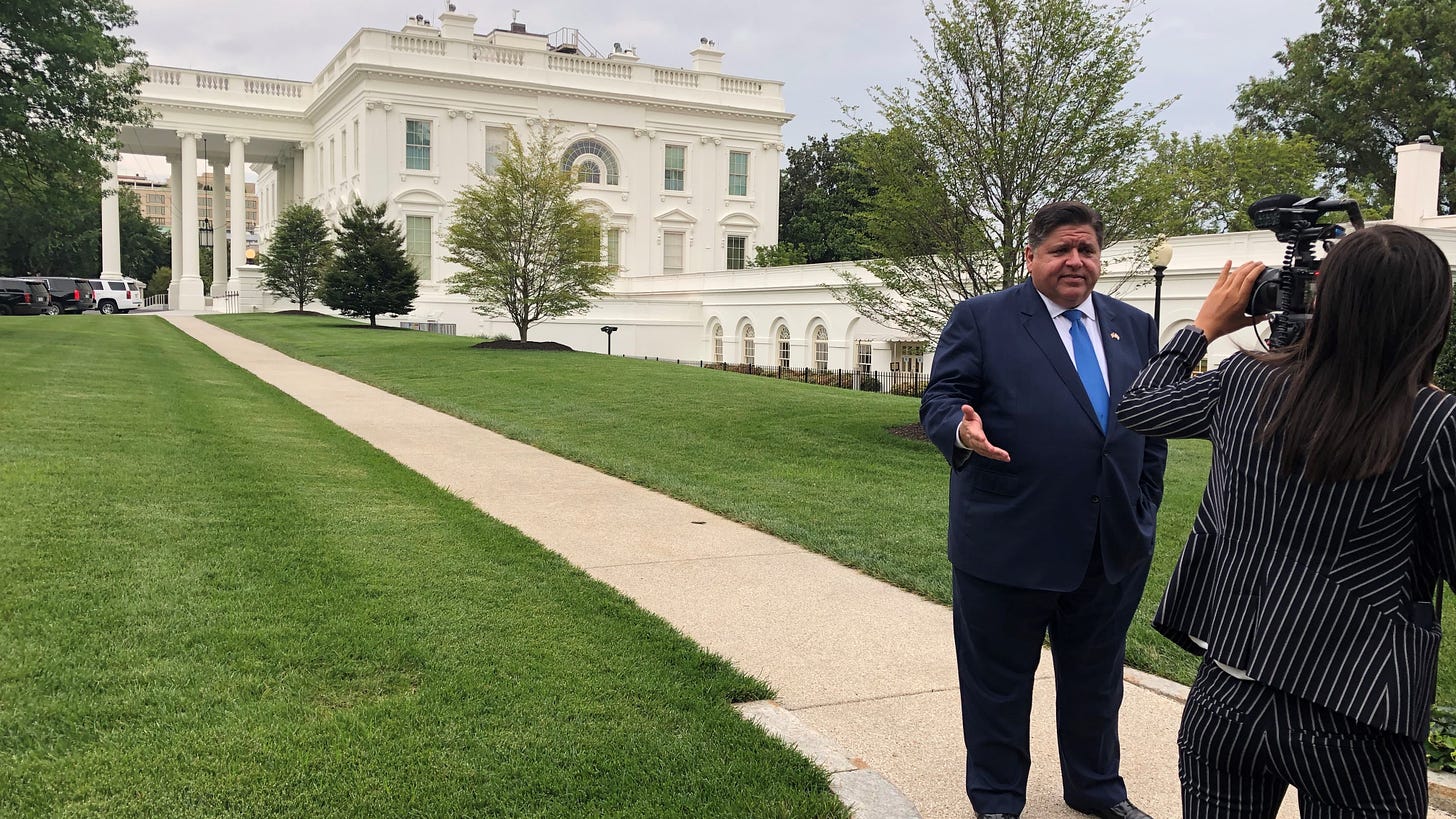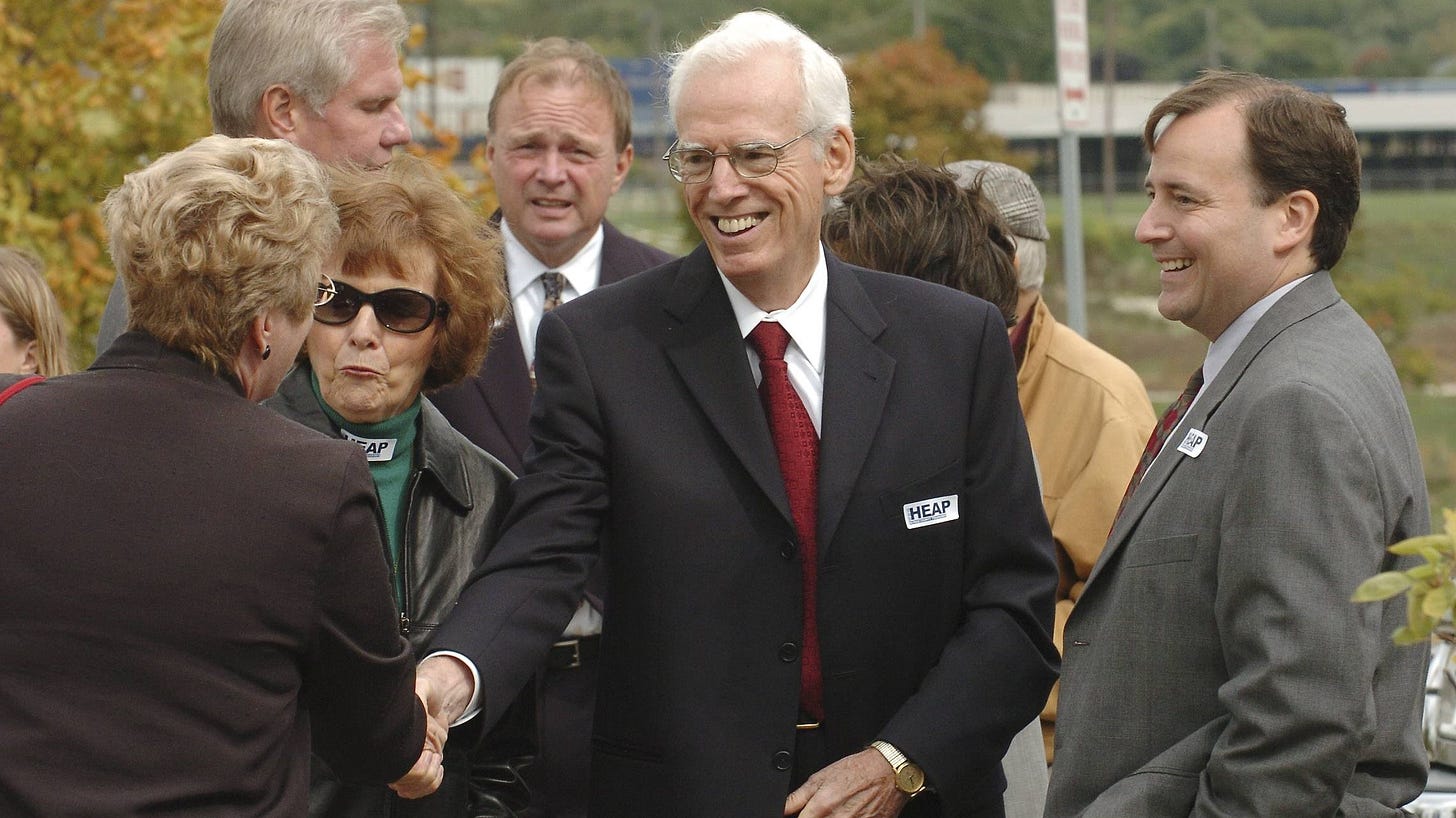THE ILLINOIZE: Monday Free for All
November 15, 2021
Good morning. Happy Monday.
For you Chicago to Springfield travelers, Bill Flick of the Bloomington Pantagraph has written an ode to politico cult favorite not-made-for-trucks truck stop Wally’s in Pontiac.
Wally’s is the first of it’s kind and was launched by a couple of kids from Missouri.
Now I want some jerky.
We appreciate you all and your support for the newsletter so far this year. Our growth has continued to amaze us and it’s all because of you.
If you aren’t a paid subscriber yet and you’re not receiving the subscriber-only newsletters on Wednesday and Friday along with breaking news alerts, let me give you a little enticement.
Subscribers will receive a major exclusive this afternoon that tells you a ton about the 2022 election cycle in Illinois.
Join us as a paid subscriber to find out. It’s only $7.99 for a month or $75 for a year.
And, as always, drop me a note at patrick@theillinoize.com with questions, comments, and snide remarks.
Let’s get to it.
YOUR MONDAY FREE FOR ALL
(note: we’re not responsible for paywalls and restrictions from other news outlets)
Lightfoot, Pritzker at the White House on Monday for Biden’s infrastructure bill signing (Chicago Sun-Times)
Mayor Lori Lightfoot and Gov. J.B. Pritzker are among those invited to President Joe Biden’s Monday White House large signing ceremony for the $1 trillion infrastructure bill.
The bill will pump at least $17 billion to Illinois for a sweeping variety of projects. Every region of the state will be impacted by the bill, which has funds for highways, public transit, airport terminal renovations, electric vehicle charging stations, Amtrak improvements, broadband, lead water pipe replacement and more.
According to Lightfoot, money from the bill will fund “huge improvements to our CTA without any change in cost to consumers while delivering the same service they expect.”
The CTA system will “become 100% accessible with the addition and improvement of elevators and other ADA enhancements,” Lightfoot said, and “the Red Line will finally be extended to 130th Street.” Also, she said “the bus system will become fully electric,” and lead pipe replacement will be faster.
Pritzker was at the White House last July 14 to help bolster the case for the infrastructure legislation.
Some of the federal funds the state of Illinois government will receive will be used to piggyback on Pritzker’s existing Rebuild Illinois, the largest infrastructure program in the history of Illinois.
“The Land of Lincoln is prepped and ready for federal dollars to jumpstart our projects ahead of schedule,” Pritzker said in a statement.
Related: Editorial: Infrastructure bill to be a boon to Illinois (Champaign News-Gazette)
Surge protectors? Experts urge vaccinations as state’s climbing COVID-19 cases spark concerns of ‘yet another wave’ (Chicago Sun-Times)
Coronavirus infections are once again climbing across Illinois, causing public health experts to worry the state is entering yet another surge — one year after it weathered the darkest days of the pandemic.
“This recent increase in cases and hospitalizations could mark the beginning of yet another wave,” a spokeswoman for the Illinois Department of Public Health said in a statement, adding the agency “is closely monitoring the recent increase in cases and hospitalizations.”
The state logged 22,600 new cases of the deadly virus over the past week. The numbers, reported by the Illinois Department of Public Health on Friday, represent an increase of 29% over the seven-day caseload reported a week ago. The Friday total averages out to roughly 3,228 cases per day over the past week.
It’s still a fraction of the caseloads recorded last fall when Illinois was in its worst surge of the pandemic.
Related: Kids under 12 won’t be fully vaccinated by Thanksgiving. That’s creating a dilemma for some parents. (Chicago Tribune)
COVID-19 cases, hospitalizations back on the rise in Will County (Joliet Herald-News)
Uptick in Effingham area hospitalizations 'worrying' as local cases rise (Effingham Daily News)
Amid COVID-19 pandemic, a look at one block in Downtown Geneva where new businesses open (Kane County Chronicle)
How faith and spiritual practices comfort and challenge hospital workers (Chicago Tribune)
There’s No Second Amendment on the South Side of Chicago (The Nation)
Growing up on the South Side of Chicago, I’ve seen my classmates carry firearms to keep themselves and their families safe from harm. And I later represented some of those same individuals in court—being prosecuted for firearm possession—when I started work as a public defender.
The people I knew growing up, and now the people I fight for in court, are also victims of gun violence themselves. I see those same people get arrested, prosecuted, and caged for the simple act of possessing a firearm—something protected and even exalted elsewhere in our country.
As the leader of the Cook County Public Defender’s Office, which represents the majority of people accused of criminal offenses in Chicago and its suburbs, most of whom look like me, I stand with those defender offices. While I support policies that actually stem the flow of guns, prevent violence, and heal those who have been harmed, I also support ending the way we criminalize gun possession. I do this because there is no Second Amendment on the South Side of Chicago.
Despite the Second Amendment’s claimed protections—that have only expanded in the last 60 years—Black and brown men in New York, Chicago, and other localities around the country aren’t protected like white gun owners: We’re arrested, prosecuted, and warehoused in prisons. The questioning by Supreme Court Justices in the oral arguments underscores a major reason why: Guns in the hands of Black and brown people are seen as a threat to public safety, while in the hands of white gun owners they are viewed as an essential means of self-defense—a constitutional right.
This is an abundantly dense, and probably racist, take on gun ownership.
While there have been close to 5,000 police reports for unlawful possession of a firearm this year, according to Chicago Police Department data, and the data doesn’t declare race, it’s obvious the vast majority are African American men.
But where Mr. Mitchell refuses to deal with logic is that these are still crimes. Unlawful possession of a handgun is a felony. And when we talk about addressing crime in Chicago and around the state, the answer is absolutely not letting people breaking firearms walk away out without charges.
Yes, I’m a white kid from the country and I don’t understand the situation on the ground in Englewood. But this isn’t about picking on armed Black kids. Crime on CTA trains and buses is a big problem. There have been around 115 aggravated or attempted assaults or battery charges with a handgun so far this year, three murders, and 24 unlawful possession of handgun charges.
It is illegal to carry a concealed weapon on a CTA train or bus, even if you have a permit. So, people who have the right and the training to protect themselves are sitting ducks to the hundreds of violent crimes that have taken place on the CTA system this year.
If you take your concealed weapon, licensed or not, on a train and a police officer finds out you’re carrying, you’re getting charged. White, black, purple, green, yellow, or blue.
So, are we prosecuting people committing gun crimes or are we letting more gun carrying criminals out without charges?
It’s ridiculous.
Related: Opinion: Scott Reeder: Need for greater accountability in law enforcement (Shaw Media)
Proposed Illinois maps would empower Black voters in East St. Louis area, NAACP says (Belleville News-Democrat)
The East St. Louis NAACP chapter hopes a panel of judges will decide to use a map that creates a mostly Black House district in the metro-east instead of one approved by Democrats.
In the state legislative map Democrats approved in September, a fifth of Black voters were moved out of East St. Louis, and thousands of white voters were moved in to empower nearby white legislators, an NAACP lawsuit alleges.
After analyzing the Democrats’ map, the court determined the NAACP and others challenging the map could propose their own solutions.
The NAACP submitted its proposed map Thursday, as did Illinois Republicans. Both would move Black voters back into state House District 114 represented by Democratic state Rep. LaToya Greenwood.
The proposed map includes East St. Louis, extends to include the “diverse” urban and suburban Belleville area, and continues east toward Scott Air Force Base, the NAACP stated in a brief submitted to the court. It also restores white voters “from far-flung rural reaches of St. Clair County” into their original districts, consolidating the Black vote.
The map would create a 114th District where Black voters make up 49.5% of the voting age population. Black voters make up only 33.4% of District 114 in the Democratic map, according to the suit.
The NAACP says if the court decides to stick with the Democrats’ map, Black voters won’t have the power to elect a Black representative, as they have since 1975.
Democrats “used Black voters as pawns in a political game of chess, moving them around without regard for these voters’ right to elect candidates of their choice,” the NAACP brief stated.
Related: GOP Legislative Map Changes Vague on Details, But Claim more Hispanic and Black Representation (The Illinoize)
'He lived his life by example': Ex-congressman Fawell known for staying true to his principles (Daily Herald)
Colleagues, friends and family are remembering former congressman Harris Fawell as a man who hewed closely to his principles, was devoted to his family and faith, opposed wasteful government spending and was ahead of his time on such issues as health care and the environment.
Fawell, 92, died Thursday at his home of 57 years on Sleight Street in Naperville.
A Republican, Fawell served seven full terms in Congress from 1984 until his retirement in 1999, representing the 13th House District. Before that, he served in the Illinois state Senate.
Mertz said Fawell was fiscally conservative but could also be socially liberal. He was one of only two Republican Illinois state senators who helped pass Fair Housing legislation in the 1960s. He also publicly supported Barack Obama in 2008.
Our thoughts are with his family and friends.
JOIN US












